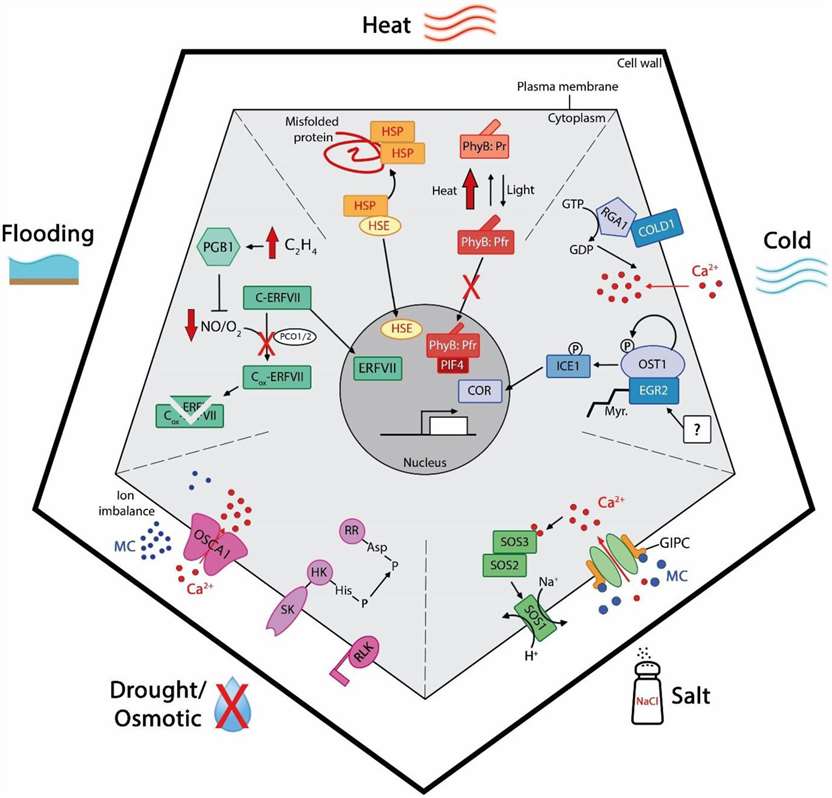Abiotic stress is part of the ecosystem, which is unavoidable and powerful. Influences from abiotic stresses can be constructive, for example, a natural wildfire can accelerate the renewal of ecosystem. However, in agriculture, it's considered to be harmful to crops, which cause a loss of yield, even death of plants.
Plants growth relies on environment, which means abiotic stressors are the most harmful factor to crop production all over the world. Crops like rice, corn and wheat are easily affected by climate change, including drought, flood, wind and extreme temperature. As well as the soil condition, such as salinity, pollution and lack of fertility. With gene editing technology, plants are genetically modified for improved tolerance to stress.
 Sensing Mechanism for Natural Abiotic Stresses in Plants (Jasper, et al. 2020)
Sensing Mechanism for Natural Abiotic Stresses in Plants (Jasper, et al. 2020)
Abiotic stresses interfere biological processes in plants, such as photosynthesis, protein synthesis, stomatal conduction, rate of transpiration and metabolite accumulation.
Abiotic stresses, such as drought, salinity, cold, heat and light stress, interfere metabolism in plant, through metabolic enzyme inhibition, substrate shortage, dehydration, accumulation of metabolites and many other factors.
Carbohydrate, amino acid, lipids and fatty acid are primary metabolites (PMs), which are important to the proper process during plant growth. As well as secondary metabolites (SMs), including nitrogen-containing metabolites (e.g., alkaloids), phenolic compounds (e.g., tannins and flavonoids), and terpenes (e.g., terpenoids and isoprenoids).
By inserting or over expressing metabolic genes into plant can improve the stresses tolerance. For example, increased putrescine, spermidine, glycine betaine, flavonoids, proline, mannitol and some other metabolites. Induction of metabolites biosynthesis enhances stress tolerance, as well as providing a defense in plants.
The most common abiotic stresses include wind, extreme temperature, drought, flood, natural disasters, cold, heat, salinity, heavy metals, poor edaphic conditions, pH level, herbicide and other factors harmful to plants growth.
Compared with nuclear genome, chloroplast genome has advantages, including high-level expression of exogenous genes, muti-gene expression and avoiding damage from compound accumulation. Additionally, in most flowering plants, chloroplasts are not inherited from the male parent, which means transgenes can't be disseminated by pollen and will not bring potential genetic pollution.
| Transgenes | Abiotic Stress Tolerance Traits |
|---|---|
| tps1 | Drought tolerance |
| merA/merB | Tolerance to the organomercurial compounds |
| badh | Salt tolerance |
| γ-TMT | Salt and heavy metal tolerance |
| mt1 | Resistant to mercury |
| b-bar1 | Resistance to the herbicide phosphinothricin |
| EPSPS | Resistance to the herbicide glyphosate |
| EPSPS/aroA | Resistance to glyphosate |
| mALS | Tolerant to herbicides |
| Bar | Resistance to glufosinate |
| Hppd | Resistance to herbicide |
| panD | Tolerance to high-temperature stress |
| lycopene β-cyclase | Herbicide resistance |
| HTP, TCY, TMT | Cold-stress tolerance |
With advanced and mature gene editing platform RecoNase™, Lifeasible offers services including gene knock-in and gene knock-out in cyanobacteria, chloroplast and yeast. Our experienced scientists have established efficient and high-precision gene editing toolkit, in which our customers can get satisfying results on time. Please feel free to contact us, get started with our professional services.
Reference